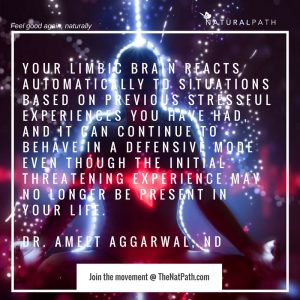Understanding the Brain
“A man too busy to take care of his health is like a mechanic too busy to take care of his tools.” —Spanish Proverb
 A primal part of your brain, known as your limbic brain, is designed to protect you through instinctive survival mechanisms. Your limbic brain reacts automatically to situations based on previous stressful experiences you have had, and it can continue to behave in a defensive mode even though the initial threatening experience may no longer be present in your life. If a traumatic or stressful experience is not fully resolved, your brain will unconsciously continue to send stressful signals to your body, especially your adrenal glands. These signals put unnecessary and prolonged stress on your body, inevitably leading to adrenal fatigue, disease and emotional problems.
A primal part of your brain, known as your limbic brain, is designed to protect you through instinctive survival mechanisms. Your limbic brain reacts automatically to situations based on previous stressful experiences you have had, and it can continue to behave in a defensive mode even though the initial threatening experience may no longer be present in your life. If a traumatic or stressful experience is not fully resolved, your brain will unconsciously continue to send stressful signals to your body, especially your adrenal glands. These signals put unnecessary and prolonged stress on your body, inevitably leading to adrenal fatigue, disease and emotional problems.
Some Techniques for Healing
Psychotherapy, emotional freedom technique, homeopathic medicines, and other therapies that I describe below help free your brain from its unconscious stressed state and return it to its relaxed or neutral state, which also stops the stress your mind puts on your adrenal glands. Healing stressful emotional memories actually changes unhealthy neural connections in your brain into healthier connections, using neuroplasticity, which is the ability of your brain to rewire its nerve connections. Such changes actually alter the emotional interpretations you have of old stressful memories, allowing you to have more positive emotions and a longer lasting healthier perspective on life.
Reducing Inflammation Reduces Health Issues
The exercises in this chapter help your brain resolve stressful situations from your past. They allow your brain to replace negative or stressful emotions with healthier emotions and thought patterns using neuroplasticity. This leaves you less traumatized and less stressed than before. As you do these exercises, remember to reduce inflammation and heal your body as well, as I have described in Part 2 of this book. Inflammation and unbalanced hormones (please see Part 2) actually reduce the ability of your brain to make healthier nerve connections, making it difficult to feel emotionally well even if you try and remain positive through these exercises.
A Safe-Mind is a Relaxed-Mind
Daily practice of these exercises will reduce your predisposition to stress, anxiety, depression, and negative thoughts. Your mind will begin to feel safe. When your mind feels safe, you begin to relax, becoming open to happier feelings. Having a positive and relaxed mind also helps you to expect more positive experiences in your life, which changes the way you approach life and brings better things to you. Your overall happiness will, therefore, be more a result of the internal healing of your own perceptions and emotions, rather than changes of external circumstances in your life.
Step by Step or All Together
Each of these exercises can be done separately or together, and some can be done every day. I highly suggest doing each and every exercise and doing the daily ones regularly. Make sure you actually complete each exercise after reading it rather than going through them in your mind. You have to fully engage in these exercises in order for your mind to experience their complete benefit.
If you would like to read more about this topic, please, check out Dr. Aggarwal’s book: Heal Your Body, Cure Your Mind
Series Part II of VII
Read the Series: I of VII
 Dr. Ameet Aggarwal ND is a naturopathic doctor and psychotherapist (Gestalt, Family Constellations, EMDR) with years of experience treating physical issues, anxiety, stress, depression, abuse, relationship issues and also working with UNICEF, UN Staff and other large organizations. His online course on using the 5 pillars of health, (free videos on health.drameet.com), lecturing around the world and being voted top 5 speakers on 2 world summits has earned him the recognition of top 43 naturopaths to follow.
Dr. Ameet Aggarwal ND is a naturopathic doctor and psychotherapist (Gestalt, Family Constellations, EMDR) with years of experience treating physical issues, anxiety, stress, depression, abuse, relationship issues and also working with UNICEF, UN Staff and other large organizations. His online course on using the 5 pillars of health, (free videos on health.drameet.com), lecturing around the world and being voted top 5 speakers on 2 world summits has earned him the recognition of top 43 naturopaths to follow.

















